#elucidator
Text
ELUCIDATOR CAME HOME. IT'S LONGER THAN I WAS EXPECTING I LOVE IT SM
i may be dying of the common cold but here are some bedridden pictures of it!!!!!!!! ft. the kirisuna ring in the last pic (alternating teardrop shaped black and clear gems... it's literally them.... i need to make a whole post talking about my kirisuna jewelry collection bc they're my everything actually)
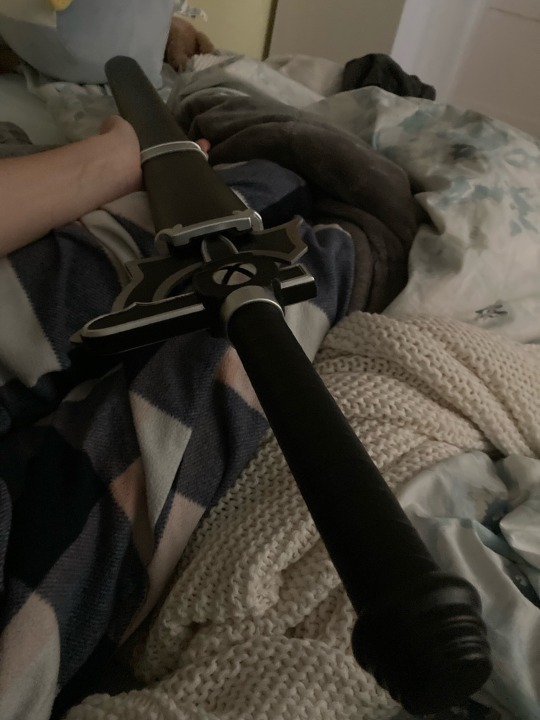
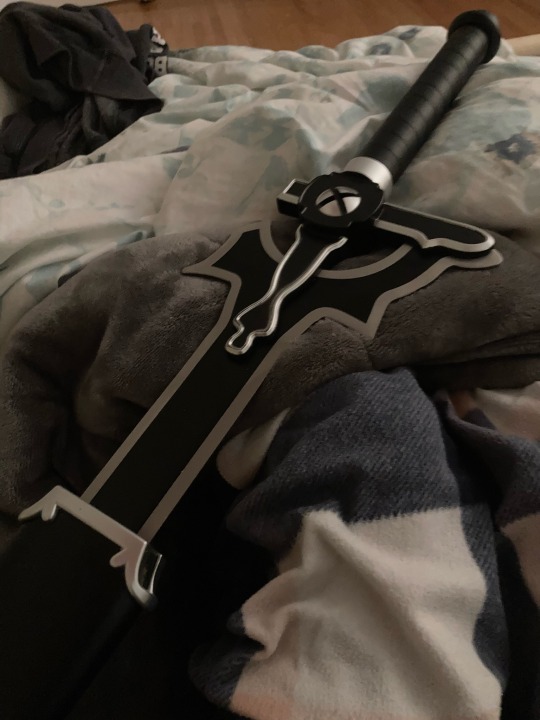
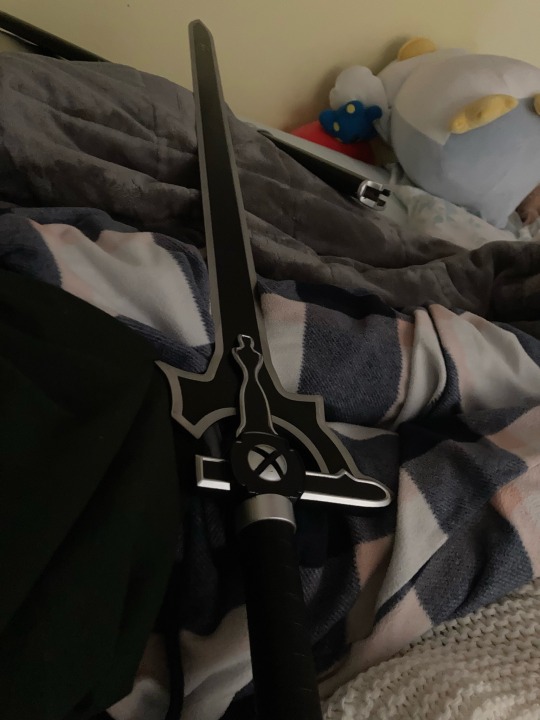
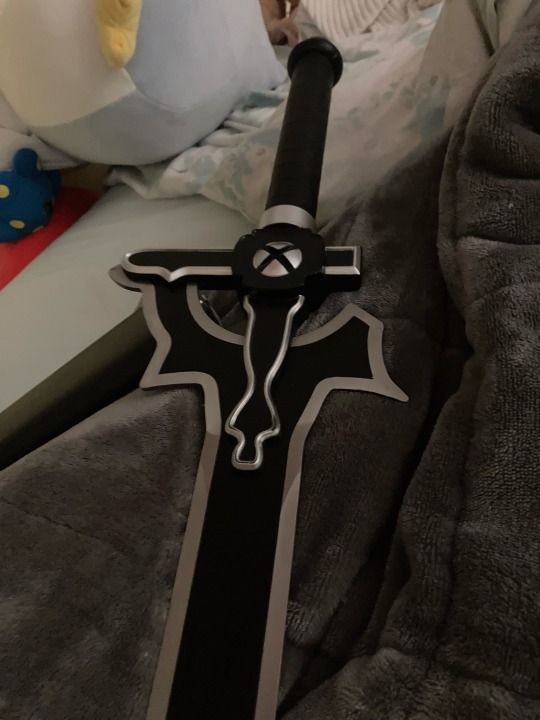
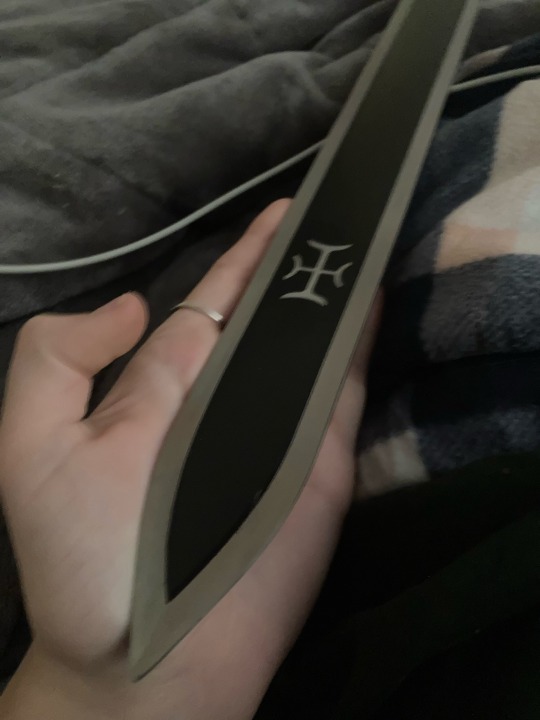
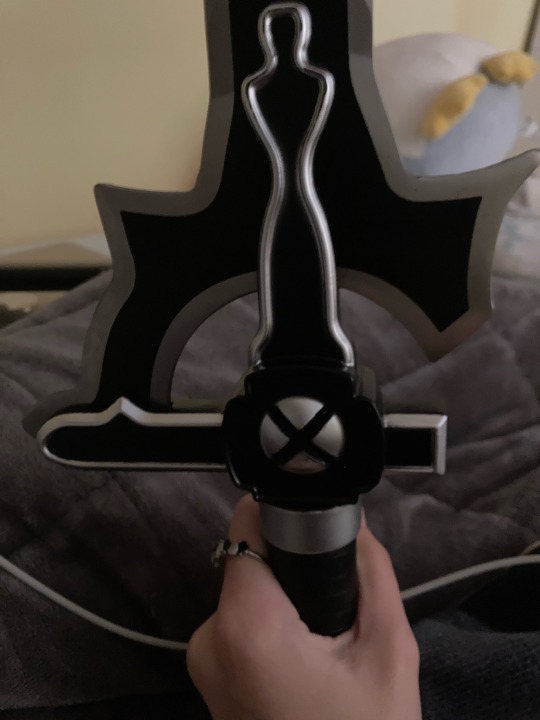
it's a dull metal replica :)
6 notes
·
View notes
Text
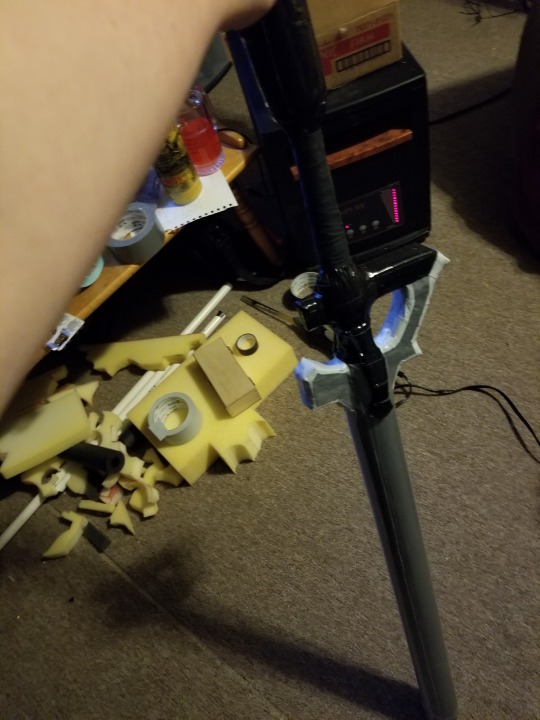

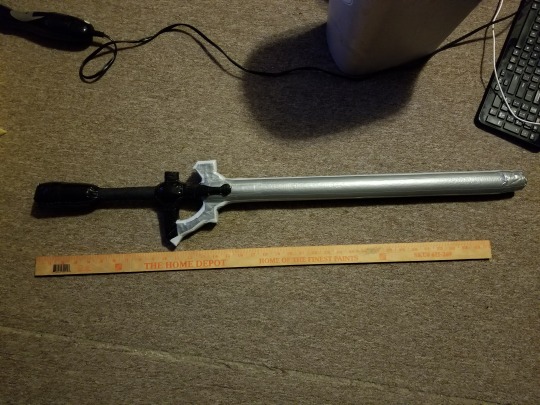
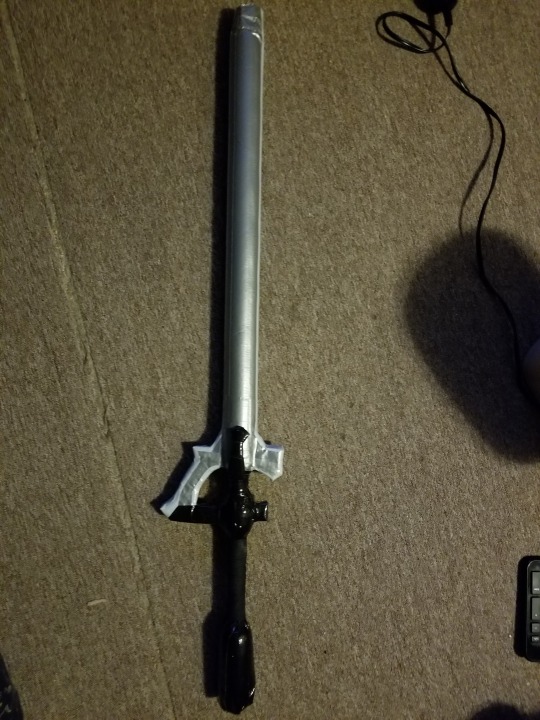
One half of a two-sword commission. Commissioner is a big fucking weeb and wanted Elucidator from Sword Art Online. So I fuckin' made it lol.
((Weapon constructed of ½" pvc, 5/8" wall pipe insulation, upholstery foam, duct tape, electrical tape, and friction tape on the grip.)
1 note
·
View note
Text
Fervent kitten opens up tight twat and gets deflorated
besitos y mamando la verga de mi vecinito su pura cabecita
Marleny puta de la calle creampie
Dirty bitch loves anal fuck at work
BAREBACK softcorte SEX in STUDIO with SEXY TOP hunky artist
pensando na Ester tigresa
Self facial/ eating my cum
Thickie icy blonde sucks stranger after softball
Buom moi cao long
Casada puta montando deslecha a corneador
#elucidator#equating#upflowing#yackety-yakking#stanzaical#Burget#Nahuatleca#indentured#theatregoing#colubaria#hackleback#favillous#unserrated#unadeptness#subclauses#asserted#Deden#Barfuss#fatsos#Khas-kura
0 notes
Text
I love that Harry can find the purple leopard print leotard and say, "This is the kind of animal I want to be." I love that it takes +8 electrochemistry to do this, that Harry has to be so in touch with what brings pleasure to his physical form to even notice the fabric in the river, to not just dismiss it as another piece of trash amidst the milieu of Martinaise malaise. I love that putting on the bodysuit requires him to reject fear and embrace his queerness (and let it embrace him), and that once he does, he will never let it go. I love that Harry will strip naked in the middle of a sleet storm in front of Kim to don this salty, weathered thing because he has finally, absurdly, found something so perfect for him.
Half Light protests, Physical Instrument mocks, Composure warns, but E-Chem knows. "Don't you *want* to feel different?" Of course. Of course you do, Harry. Of course you want to become someone who you actually want to be.
It's so beautiful that Harry can actually discover a meaning for himself, some small solution for the depressive horror of his pre-bender life. Thank you, leopard-patterned bodysuit. And thank you, Helen Hindpere, for adding this to the game.
(Fayde Reference)
513 notes
·
View notes
Text
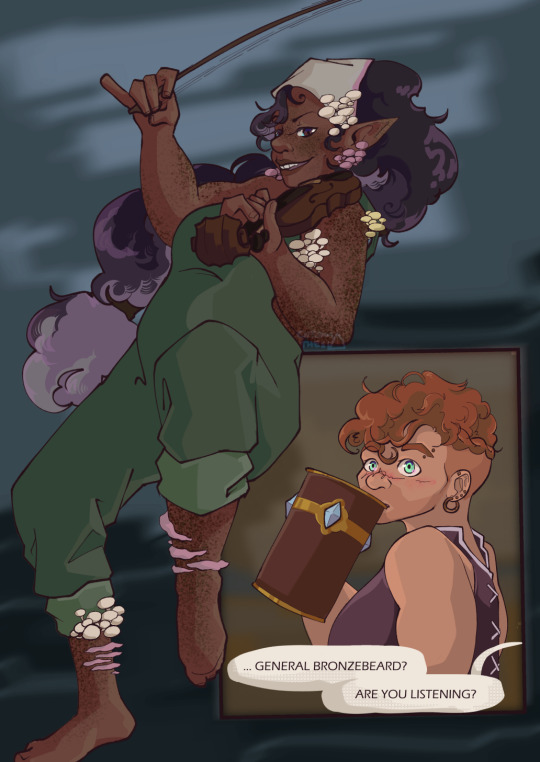
it's ALSO @naddpodgifting season which means more art ! i'm p sure my giftee isn't on tumblr (slash i wasn't given a tumblr url in the initial assignment) so not tagging anyone, but i got to draw a cute little moonshine/jaina moment for him. some close-ups are under the read more!
[image desc: a scene with two characters. moonshine (full-body) is happily dancing while playing a fiddle. jaina (insert) watches from the side as someone tries to catch her attention.]
close-ups of the guys in question
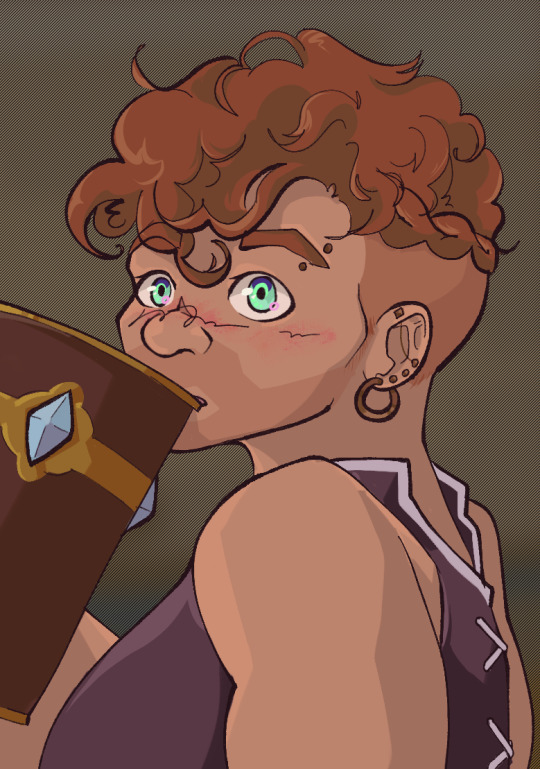

#naddpod#not another dnd podcast#naddpod gift exchange#naddpod gifting#my art#moonshine cybin#jaina bronzebeard#is there a ship tag for them. um#if there is i don't know it and when i find out i'll update this#moonshine's hair gets lighter near the ends bc it's full of spores <:)#all of jaina's piercings are done in bronze for reasons that i hope you can elucidate
218 notes
·
View notes
Note
yo i really like your content and agree with you on most things but i don't really know what you mean with that last one. my friends from ukraine both oppose the war's existence but would rather not be violently annexed by an imperial power so of course they, with little other options, support resistance efforts.
it's really hard for me to understand what you're going for because if ukraine stopped fighting back it'd just get taken by russia. maybe i just have bad brainfog, but it's hard to understand what you're asking us to do and believe. should we try and take out both the russian and american imperialist powers at once? but that's unrealistic and unlikely to happen in the near future, no matter how much i personally support it, which i do.
i guess my question is, what's an actual realistic thing we should support in the meantime? we can't just pretend that somehow revolution will take out both american and russian imperialist interests immediately, so. it's like, well yes we should have a better world playing by better rules, but how do we do the right thing when we are bound by the rules now.
i have friends who have family who died in the war, and sometimes it feels like bloggers i otherwise trust say things that sound suspiciously close to "ukraine should stop this pointless fighting and give up." which i am aware isn't your intention, and i want to be an effective anti imperialist and have the correct and informed opinions on stuff like this, but i am having a very hard time understanding what you are trying to say.
i really promise i am not a concern troll or nato apologist or anything, i just also have personally been struggling with what to support and how to save innocent lives. i hate war and i wish we could magically create a situation in which ukraine didn't have to rely on horrible things for self defense. i just don't know what to do or believe because my friends would rightfully hate me if i said ukraine should stop defending itself.
i mean, first off: don't worry, you obviously don't sound like a concern troll or a nato apologist. this is an eminently reasonable question -- healed's law strikes again. & i certainly don't blame you for worrying that marxist-leninists are apologists for russian imperialism, because unfortunately many self-proclaimed marxist-leninists have been deceived by the frankly paper-thin figleaf of 'denazificaiton'--even as putin, puppet of the russian bourgeoisie denounces lenin & the bolsheviks & the soviet union with every speech he makes. it sucks!
first of all, i think the important thing here and the central point of disagreement is on what constitutes 'ukraine'. liberals and nationalists alike consider nations to be fundamentally one whole: that all the people of ukraine together constitute 'ukraine', and so 'ukraine as a whole' has consistent interests, and acts as a one--the ukrainian government represents this unitary ukraine armed forces of ukraine fight for this ukraine.
but the marxist analysis of the nation is completely different. from the marxist perspective, the nation is split across class lines. ukraine is not 'ukrainians', but in fact 'the ukrainian working class' and 'the ukrainian bourgeoisie'. now, of course, there are further contradictions even within these classes--there is a faction of pro-Russian bourgeoisie, and a faction of pro-Western bourgeoisie. but remember, we must apply the same analysis to these countries too: the 'pro-Russian' Ukrainian bourgeoisie do not wish to submit to Russia's working class, but to their oligarchs. the 'pro-Western' Ukrainian bourgeoisie are not opening the nation's economy to the European and USAmerican working class, but to their bourgeoisie. so the bourgeoisie are, in every case--even when split among themselves--only ever in league with other sectors of the bourgeoisie.
so, through this lens, how do we see the war in ukraine? well, i think that the union of communists in ukraine must have a far better handle on this than i, because they're living through it: so i will quote their analysis and then elucidate on it in relation to your question.
The puppet regime in Ukraine participates in this war in the interests of Ukrainian oligarchs, who have made themselves completely dependent on big capital of the West and NATO, who have turned the Ukrainian army into an advanced military unit of the Western bourgeoisie. The war is not about "the Ukrainian nation," not about "the Ukrainian language and culture," not even about "European values". It is a war for the united interests of the Ukrainian and international bourgeoisie, which coincide in their desire to destroy the economic and political power of the Russian bourgeoisie. No interests or rights of Ukrainian workers are protected by this war. Both Ukrainian and Russian workers in this war have only the right and obligation to go to the front and die so that one group of the world bourgeoisie defeats the other and gains more monopoly rights to oppress the workers, both in their own country and in the defeated countries.
[…] For the working class of Ukraine, this imperialist war has the most tragic consequences. It lies on the shoulders of the workers the role of "cannon fodder" and the inevitable deaths in the fighting, mass impoverishment, unemployment, complete restrictions of rights and freedoms for the sake of protecting the interests of the Ukrainian big bourgeoisie, the oligarchs and the interests of the Western bourgeoisie in destroying and robbing Russia and seizing its natural resources. This will inevitably be accompanied by the destruction and seizure of Ukrainian industrial and natural resources, including in the case of Russia's success. The same fate awaits the vast majority of the Ukrainian petty bourgeoisie.
The big bourgeoisie has already bought its children out of the war and taken them abroad, just as it took its capitals out. But that is not the main point: the big bourgeoisie is profiting from the war under Zelensky, just as it profited under Poroshenko: stealing finances, making money from reselling weapons, supplying the army with uniforms, food, repair work, humanitarian aid, etc. In war the bourgeoisie makes billions of dollars, while the mobilized people have to be equipped and fed by relatives, friends and volunteers – which is clearly not enough. As in peacetime, but even more brazenly, the bourgeoisie is getting rich off the bones of the working class!
—Union of Communists of Ukraine, On the War and the tasks of the working class
that is to say--the russian army, which is funded by the russian bourgeoisie, is fighting to establish the exclusive right of that russian bourgeoisie to oppress and exploit the ukrainian people. meanwhile, the ukrainian army, funded by the ukrainian and western bourgeoisie more broadly, are fighting to maintain the exclusive right of the ukrainian and western to oppress and exploit the ukrainian people. already, ukrainian public assets are being put up in a fire sale for western buyers--(and of course, should russia's offensive have been as succesful as they'd hoped and this war already over, they'd be doing much the same thing for the benefit of buyers among the russian bourgeoisie).
this is what is meant by 'inter-imperialist' war. it's easy to say 'well, the ukrainian army isn't imperialist--it's fighting for the nation's independence!' but in terms of real economic interests there is no 'the nation'. the ukrainian army isn't fighting for the ukrainian working class (which of course includes themselves!)--the government that pays them and the states that equip them wouldn't do so out of any sense of interest in the well-being of the working class. we can see this clearly as the western imperialist powers now start to equip the ukrainian army with depleted uranium shells, which will poison swathes of ukrainian land and cause sickness and death among the people this army purports to be fighting for. the goal of the ukrainian state and army isn't to protect any working class people--only to protect its total right to the economic exploitation of those people.
it's this that the ukrainian state is afraid of when it fights not to cede territory, not the (surely real, to be clear!) brutality from the russian state that would face the inhabitants of any such ceded territory. in fact, funding nazi groups that operated in those areas before the war and will surely continue to operate afterwards, the ukrainian govenrment makes it clear that brutality against the inhabitants of its eastern provinces alone does not phase it, so long as the ukrainian bourgeoisie (& their western bourgeoisie patrons) continue to be the ones profiting off the region's people and resources.
elsewhere in the article the UCU observe the same thing that can be observed by those outside of ukraine by listening to the words of zelenskyy and the ukrainian government's allies--that even the goal of 'protecting its people' [read: protecting exclusive economic/extractive access to those people] has been sidelined by the dream of a total or partial obliteration of the russian bourgeoisie entirely--not for any moral or anti-imperialist reason, but simply so that the ukrainian/western bourgeoisie no longer have competition.
[...] the goals of warfare are changing. If at the first stage of the civil conflict the Ukrainian regime aimed to restore state control over the Ukrainian territories, where this control was lost, then at the second stage it aimed to destroy Russia as a condition for the existence of Ukraine.
—ibid.
so--now that i've really dug into the precise nature of this war and why it's being waged on both sides, i'll answer some of your points directly:
if ukraine stopped fighting back it'd just get taken by russia
"ukraine should stop this pointless fighting and give up."
both of these positions, both the one you hold yourself and the one you worry about others expressing, assume that what the ukrainian armed forces with NATO backing and full-throated embrace of fascist paramilitaries is doing constitutes 'ukraine' 'fighting back' against 'russia'. but it doesn't--it represents the ukrainian bourgeoisie fighting back against the russian bourgeoisie.
so, the big question--do i think that the ukrainian proletariat should abandon armed resistance against the russian invasion? absolutely not!
genuine popular resistance against the russian invasion is heroic and commendable--i am under no belief whatsoever that in the face of imperialist war the ukrainian people should not arm themselves and fight against the imperialists. i just reject the framing of the actual war as prosecuted as constituting this, because, to go back to what i've already established, there is not in fact one 'ukraine' but two--only one of which constitutes in a mieaningful sense the ukrainian people. i don't believe (and neither do the UCU, whose analysis i base mine on somewhat) that 'the war' as you ponder 'supporting' constitutes the ukrainian proletariat arming themselves or fighting against imperialism on their own behalf, but rather being armed by the bourgeoisie and fighting on their behalf.
and obviously i'm not an idiot who's blind to the actual numerial and material realities. the communist, anti-imperialist movement in ukraine, just like in most of the world, is completely dwarfed by imperialism and its footsoldiers. 'the ukrainian proletariat as self-armed acting organization rising up and challenging both imperialisms and freeing itself from both sets of bourgeoisie' is not something that's gonna happen tomorrow, and it's not an immediately actionable plan--no ukrainian communist can wake up tomorrow and say 'well, today i shall hit the big proletarian revolution button'.
the realities are that as the meeting ground between two imperialisms, ukrainian communists have to make decisions about which one they can most ably fight, might need to temporarily align themselves with or allow themselves to benefit from the ukrainian bourgeoise state--but never support it. like any bourgeoise state, a communist should know the ukrainian state is an enemy of the proletariat. yes, the pressing material realities on the ground might well make cooperation with that bourgeoise state the best temporary option--but 'cooperation' should never mean 'support' or 'loyalty', and should be done only tactically with ultimately loyalties remaining above all else with the working class.
in fact, refusing to offer the government and army a show of support and valorization is a key element of creating the conditions--radicalization, agitation--that would allow the proletariat to effectively rise up and truly combat imperialism, rather than choose under which imperialist heel they would rather be ground into dust. don't support an end to the war on either imperialist bloc's terms, but rather on proletarian terms--understand that the state of ukraine is not on the side of the ukrainian people, except tangentially, in individual moments of necessary alliance. raise awareness of the true war, the class war, and resist the ukrainian state's claims to stand with the people when it pursues the interests of the bourgeoisie.
tldr: the anti-imperialist position is not that the ukrainian proletariat should not be fighting, or that their fight is not worth supporting. the anti-imperialist action, therefore, is to draw the most awareness possible to this division within 'ukraine' among the working class themselves, make them aware of the realities of the economic condition. this is of course the foremost anti-imperialist and communist task across the entire world, because it is only through creating organizations of the working class that will fight for the working class can international imperialism be dfeated.
i'll leave this answer off by adding what the UCU said about this very topic in the same statement i've been quoting:
We understand the complexity and danger of these tasks, which inevitably cause repression on the part of the bourgeois political regimes. That is why workers' and communist organizations will need to develop illegal forms of class struggle along with legal ones in order to set and implement such tasks. The UCU has been forced to conduct its work in illegal forms since 2014.
Many workers' and communist organizations may consider these antiwar tasks impossible because of their organizational weakness and lack of influence on the working class. However, historical experience shows that a correct and honest formulation of the tasks of the working class in conditions of war – real, not momentary tasks – may not yield success immediately, but will yield gains as the revolutionary situation intensifies.
Since the task of destroying capitalist social relations is an international task, the international coordination of workers' and communist parties' actions, including the joint elaboration of tasks for the struggle against the imperialist war of the twenty-first century for the sake of uniting the international struggle against this war, for a communist reorganization of society and world peace, is becoming increasingly important.
Proletarians of all countries, unite!
#ask#long post#i hope this helps! i entirely understand your worries & concerns & i genuinely hoep this elucidates something about the situation for you
422 notes
·
View notes
Text
Earl Sweatshirt: A Geography of Grief and Growth

I made myself the poet of the world. The white man had found a poetry in which there was nothing poetic….I had soon to change my tune.
—Frantz Fanon, Black Skin, White Masks (1952)
I suggest that we do not necessarily need to hear and know what is stated in its entirety, that we do not need to “master” or conquer the narrative as a whole, that we may know in fragments.
—bell hooks, “Teaching New Worlds/New Words” (1994)
Breakin’ ’em down to micro-fragments.
—Saafir, “Battle Drill” (1994)
What is asked of me is not to ascend but to descend.
—Robert Bly (1990)
1.
Earl Sweatshirt’s arc, swerving and dervishy, isn’t difficult to see, as we’ve witnessed it with him—we’re either interlocutors or interlopers, both with questionable motives. So when Earl looks back on school daze, as he does on “OD,” we look back with him (though ours is often an imperial gaze [HOW COULD IT NOT BE?]). We tee-hee and titter as we hear that “somebody tooted in the student commons,” tooted being the most puerile word for gas he could have chosen. An array of scatological options were ignored. It’s a deliberate gesture toward juvenilia. He doesn’t want his expression to be too mature, ha. He wants to welcome you to the romper room, ha. Remaining a kid until the moment he expires, apparently. So he sets the adolescent scene: the student commons. “The bell rang,” and the accused student was spared the prolonged opprobrium. In about four seconds, the student will begin to post. He “went home and argued in the comments,” channeling his embarrassment elsewhere, talking shit (shit) on the internet behind the safety and quasi-anonymity of a screen—an odd facade. He can walk right up to your avi and diss you. That’s his philosophy. The public humiliation replaced with a private self-possession. The discomfort of the crowd exchanged for the solace of solitude.

2. DID AN ANGEL SPEAK?
The sonics of “tooted” and “student” are twee, giggle-inducing. We laugh along with the concatenation of m and n phonemes [somebody | student | commons | rang | went | home | then | in | comments]. The near-homophonous commons and comments scan hysterical. With “OD,” it’s easy to confuse adolescence with adulthood. That “somebody” committed this social transgression seems defensive. Maybe it was him—the subject, Earl, Thebe—seeing as how the rest of the song is delivered in the first-person. Embrace the Age of Immaturity. Channel the Fat Boys: Darren Robinson’s flatulent beatbox. Place it beside the disorderly lyrics that Bobbito spits: “I write my own shit from finish to start, / Diminish the heart, / I eat a knish and then I fart.” Like the Cenobites, Earl kicks a dope verse, and only that. “I keep my sentences short,” he says on “EAST.” Beauty is brevity, brevity beauty. A “brevity pack,” as Earl has referred to the Feet of Clay songs. He strives to be live ’cause he got no choice. He runs his own business like James Joyce. In A Portrait of the Artists as a Young Man, a similar flatus incident unravels. At Clongowes Wood College (Stephen Dedalus’s Coral Reef Academy), a “stout student who stood below…on the steps” by the name of Goggins “farted briefly.” Sonically, the sentence shares much with Earl’s opening line. Dixon asks, in a “soft voice,” “Did an angel speak?” But the others react with bellicosity and name-calling (stinkpot; flamingest dirty devil). Goggins doesn’t retreat home; he simply asks, “It did no one any harm, did it?” You still bet that you can harm me, but you don’t alarm me, Goggins might say another way, reprising Del the Funky Homosapien, echoplexing Masta Ace.

3.
Earl “watched the doppler move,” the wavelength shift—the siren song of the “toot,” something insidious—or maybe it’s just the tremors we’re feeling. Woop, woop: that’s the sound of the beast, KRS would say. The frequency shivers. The shift, the movéd doppler, means Earl is immediately older, he’s the child who “get[s] introduced to violence,” even if he acknowledges the line was inspired by his nephew on a playground in South Africa, experiencing apartheid reincarnate as a whiteboy cuts him in line for the slide. Cranly, bullying Goggins, “shove[s] him violently down the steps.” The doppler moves. It slides into violence—like the violence visited upon the MOVE compound located at 6221 Osage Avenue in Philly in 1985. Gradations of black/white. ELUCID mentions the “gray on [his] face showing age” on his Osage (2016) project. Isn’t it strange—how the youngins can turn cold, hoarfrosty, in an instant? The grayscale cover to ELUCID’s tape is graced by a photograph of Birdie Africa, the sole child survivor of the siege. The bone fragments of the MOVE children have since been used in anthropology courses at UPenn and Princeton—case studies. It’s a good trope. Fascinating stuff.
4. TRYIN’ TO TRANSFORM YOU BOYS TO MEN LIKE DAYCARE
When JuJu of the Beatnuts asked, You want pain?, he wasn’t referencing the dramatical-traumatical pain Earl negotiates—JuJu’s question posed a ruffneck and ruffian pain on “Watch Out Now.” Somewhere closer to Marcy, where Jay-Z’s streets was watching. Earl clocks minutes, anaphoric with what he watches (I watched the doppler… / I watched a child…), much like Dylan’s portentous hard rain in which he saw endless racialized visions: “I saw a newborn baby with wild wolves all around it”; “I saw a black branch with blood that kept drippin’”; “I saw a white ladder all covered with water.” For Earl, the ladder is a slide. The saw is watched. Witnesses all.

5.
In “Theory as Liberatory Practice,” bell hooks writes that she “came to theory because [she] was hurting”: “I wanted to make the hurt go away. I saw in theory then a location for healing.” hooks says that she “came to theory young, when [she] was still a child,” citing Terry Eagleton who argues that “[c]hildren make the best theorists.” Children, Eagleton insists, possess “a wondering estrangement.” No wonder, then, that “since a jit” Earl has found no use in “giving up.” He rather make it make sense.
6.
I beat you to the point. Having gained experience, there’s nothing you can tell Earl that he doesn’t already know, that he hasn’t already seen. He’s seen enough, had enough. He doesn’t await the mob’s pursuit; he places the noose on himself, he RE: DEFines it within his own lexicon. His noose, therefore, “is golden.” He’s a young youth, rockin’ the gold [noose], DEATHWORLD goose. He speaks with criminal slang, with a split tongue like ELUCID. Where ELUCID was “true and living, actual—no dull axes, owner of all heads,” Earl is “true and living, lonesome,” with no skulls to keep him company. He has to square up with the “pugilistic moments” on his own.
7. I AM OLDER THAN I ONCE WAS AND YOUNGER THAN I’LL BE
I’m thinking of “The Pugilist at Rest” (1991) by Thom Jones, whose epileptic protag describes a “grainy black-and-white photograph” of the bronze statue called The Pugilist at Rest. The pugilist, with a pocketful of mumbles, has “slanted, drooping brows that bespeak torn nerves” and a forehead “piled with scar tissue.” Torn nerves and scar tissue—sounds like the physical manifestations of grief. And, yes, Earl has grieved, and he continues to grieve—as listeners, we’re accustomed to his grief pedigree, as per Ka. In the past, Earl was “panicking a lot”—he just “want[ed] [his] time and [his] mind intact.” That’s a cold fact.
The narrator of “The Pugilist at Rest” readies himself for a cingulotomy—a psychosurgical procedure that will “cauterize a small spot in a nerve bundle in [his] brain.” In other words, he wants to keep his mind intact. The neurosurgeon promises the operation will lift “the heaviness of a heart blackened by sin,” which is what convinces the narrator to agree to it. Good grief, he thinks, he’s been reaping what he sowed. He “can’t go on like this,” barely living “with a deadening sense of languor,” a phrase which calls to mind Earl’s lethargic, slugabed flow. Feeling insane in the membrane, like he’s a Soul Assassinated, exploring the depths beneath his whooligan behaviors. 376 was a brothel. “Good and evil are only illusions,” Jones writes. In anticipation of the surgery, the protag considers the worst-case [so what, so what] scenario: “If they fuck up the operation, I hope I get to keep my dogs somehow.”
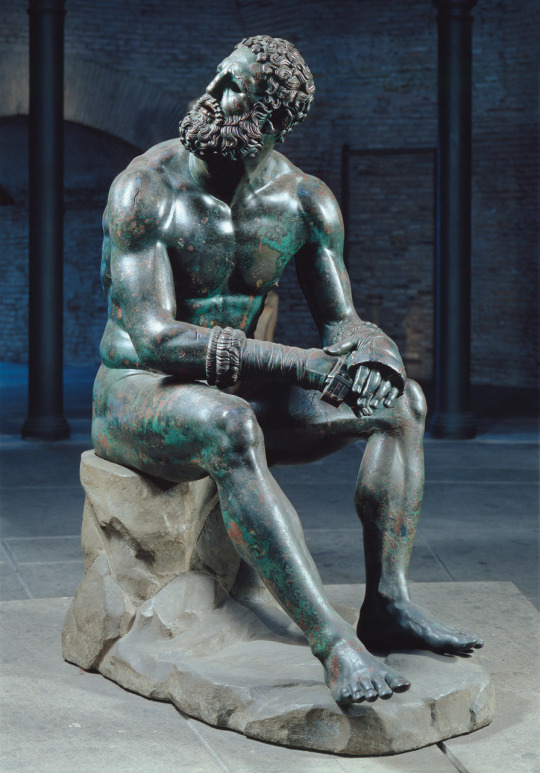
8. MOURNING & MEDICINE FOR MELANCHOLIA
Grief carries its own antidote along with it.
—Charles Brockden Brown, Wieland (1798)
“Grief is the door to feeling,” Robert Bly says. But Earl, on “Grief,” told us he “ain’t been outside in a minute”—and that minute, whether we’re speaking with criminal slang like Nas on “It Ain’t Hard To Tell” or not, is an eternity. Earl hadn’t crossed that threshold, hadn’t kicked in that door. MIKE would realize it much later on “No Curse Lifted (rivers of love),” how you “had to walk through the grief,” even if it “was the worst feeling.” In 2015, though, Earl found these passageways distorted. Like the undulating photograph on the cover of his first mixtape. Like the blur-obscured selfie on the cover of Some Rap Songs. Like the static-scrambled cover of I Don’t Like Shit, I Don’t Go Outside. Earl’s dealt in fragmentary confuzzled noise for a full career. He’s been standing on the corner, red burnt, moving down alien lanes paved by GBV, greenthinking to himself. It ain’t hard to tell that Earl “don’t act hard” and yet is a “hard act to follow.” The density or opacity of his exterior notwithstanding, grief don’t come easy. “As men,” Bly says, “we’re taught not to feel pain and grief as children.” So Earl spits somnolent, numb-tongued and slack-jawed. Like he said on “Cold Summers”: muffle my pain and muzzle my brain up.
“I’ve been alone in my shit for the longest,” he spit on “Grief,” and in work as recent as “Vin Skully,” he’s still figuring out “how to stay afloat in a bottomless pit.” Bly says that “we receive something from our father by standing close to him—something moves over that can’t be described in material terms.” Bly speaks of being in a “conspiracy with his mother” from early on. Earl finds himself “thinking ’bout [his] grandmama” while he wallows and lies in a bottle. “Grief” catalogs all the things his mama taught him. Earl’s work, of late, is autodestructive. He peels away and pastes back haphazardly. He vibes with this Bly shit: “If you can deny something so fundamental as grief in the whole family, you can deny anything. And then how can you write poetry if you’re involved in that much denial?”

Bly goes on to quote Alice Miller, the psychoanalyst who gave us The Drama of the Gifted Child (1979): “When you were young, you needed something you did not receive, and you will never receive it. And the proper attitude is mourning.” Mourning is the proper attitude, not blame—mourning. Mourning makes its way through moaning and mumbling—Earl’s current intonation. On “Grief,” he “cut the grass off the surface [and] pray[s] the lawnmower blade catch the back of a serpent.” Philip Larkin’s poem “The Mower” (1979) leans more literal: “The mower stalled, twice; I found / A hedgehog jammed up against the blades, / Killed. It had been in the long grass.” Larkin’s speaker genuflects before the innocent critter, recalling how he “fed it, once.” Now, he mourns how he has “mauled its unobtrusive world, / Unmendably. Burial was no help.” Earl, of course, is less forgiving of the serpents in the grass. They’re threats, not friends. Still, a void opens up when the mower—(and let’s not forget the lawnmower is a modernized scythe)—does its mowing. Grief is the door to feeling, and on the other side:
Next morning I got up and it did not.
The first day after a death, the new absence
Is always the same; we should be careful
Of each other, we should be kind
While there is still time.
9. NOBODY KNOW WHO MADE THIS WELL, FOR IT WAS HERE WHEN I WAS BORN
“Come get to know me at my innermost…”
Riveting, Earl raps. Earl raps are riveting. We fix to the flow—riverrun, past Eve and Adam’s. We’re invited to know Earl, to become familiar, and his “innermost” is a constant vacillation between optimism and [afro]pessimism. The sudden switches—these switches on bitches like fixed with hydraulics—establish what Danny Schwartz, writing for Rolling Stone, called an “uneven terrain.”
Earl’s “family business [is] anguished,” and that’s recognizable. We’ve known Earl (on “Chum”) with the “pendulum swinging slow” and low. He holed up, hostage-like, in his “heart’s bottomless pit.” Poe’s “The Pit and the Pendulum” (1842) brand of captivity. “I was sick,” that narrator says, “—sick unto death with that long agony.” Something tells me there should be an exclamation point there (SICK!). Earl Sweatshirt was down, down, down. “I was in the fucking pits for like 10 months post my pops dying,” he said in an interview. The Spanish Inquisition ain’t shit.
But for these countless downs, “OD” tracks the ups like naloxone in the nasal membrane. “Now I need atonement,” Earl notes—he makes a case for reparations. He “sets the goal[s]” like some motivational speaker. If “half [his] wings is broken,” he can “spread the other for [his] brodie OD.” Somewhat circumspect as he’s “tiptoeing,” yet the approach is laden with “too much love.” Even when his “sister showed in a rut,” he’s joining arms with her and “getting over, sending up.” That rut she walks—like Eudora Welty’s worn path (1941)—is a path through the pinewoods, and she’s suddenly Phoenix Jackson. “She was very old and small,” Welty writes, and she moves “with the balanced heaviness and lightness of a pendulum in a grandfather clock.” Even with her pentium processing and pendulum low, she swings back up—the rise of her namesake. She screams phoenix, her feathers and flames are one skin. “Living in the moment,” Earl raps, and his craft is bars. “You been corrupt”—and, sure, who hasn’t?—but you recover with “some ginabot.” Welty’s Old Phoenix surveys a spring “silently flowing through a hollow log.” She bends and drinks and says, “Sweet gum makes the water sweet.” It’s the equivalent to Earl putting “shilajit in his sippy cup,” which is “healing cuts revealingly.” And, yes, from a “sippy cup,” so we’re back to toddling around again (“Since a jit,” he says). “I can’t give enough,” Earl raps, his last winding-sheet made of nard and myrrh.
10.
We crouch and teeter, caterwauling along the ledges, for we’ve got these clumsy feet of clay. This is the intended effect[/defect]; this is the rubble of what Earl calls the “crumbling empire.” This is us feeling the violent vibes of the “death throes” he speaks of. Why would we expect anything to resemble traditional song or rhyme structure when the earth quakes, civilization trembles, and Earl’s dungeon shakes? His chains have fallen off. The tenor is tremors. He’s living the trife life—hell on earth—but still living. Earl’s done trying to not look down—he embraces an outer appearance which scans dour; he deliberately gazes into the pit, inviting the vertigo, for it “haunts the whole of existence,” as Fanon says. But Frank B. Wilderson III promises a “vengeance of vertigo.”
11.
Gallons of rubbing alcohol flow through the strip, and Earl’s lips. He’s “refilling the pump”—his heart, yeah—but with a sawed-off shotgun, hand-on-the-pump posture. There’s “no concealing it,” not even with a concealed carry permit. He brandishes right back at “the enemy up in arms bearing snubs.” The mood swings; been down so long it looks like up to him. The turns require tourniquets. This is some Battle of Dak To torture—somewhere between Retaliation and the Heavenly Divine. Emotional turmoil seems violent by design, and Earl’s “memory [is] really leaking blood.” Fear not, the blood is “congealing, stuck.” Like Havoc says, “The Mobb rollin’ thicker.” Prodigy cites it, too: “This ain’t rap—it’s bloodsport.” But Earl has known that all along—he’s been “mobbin’ deep as ’96 Havoc and Prodigy did” since 2013.
12.
HipHopDX’s Kevin Cortez referred to listeners having to “sift through the muddle” in order to appreciate the bars, but where muddle suggests a disorderly conduct, a kaos network, Earl’s style, more appropriately, models. The woozy, wavy, and inner-conflict-war-torn vocals model an abstraction that anticipates the listener’s loyalty. This is what I’ve got, brief and cryptic as the gesture may be, the model says. Writing for NME, Dhruva Balram described Earl’s lyrics as “slurred,” but slurry is the form.
13.
If the empire can deploy Orwellian technologies of repression, its outcasts have the gods of chaos on their side…
—Mike Davis, Planet of Slums (2005)
So if we’re giving ourselves over to the woozes and waves, we’ll just as well find ourselves lost. Let’s go—like those tourist books run by students—and let’s wander eastward. Follow our napkin-scrawled directions and disorientations to a somewhere elsewhere. Let’s go east for a second, for a spell, on a lark, in the dark (word to AKAI SOLO). Earl’s bloodwork contains “pieces of slums”—or more aptly, [sLUms]. He’s hand-to-hand with that Jungle Boy MIKE, but also the god Mike Davis. “[T]he cities of the future,” Davis wrote, would be “constructed out of crude brick, straw, recycled plastic, cement blocks, and scrap wood.” Just the same as an Earl Sweatshirt verse is built—under the tutelage and overstanding-sharing, symbiotically, with MIKE. Davis says our cities aren’t “cities of light soaring toward heaven,” but a world that “squats in squalor, surrounded by pollution, excrement, and decay.” Smells like somebody tooted in the student commons. Smells like a slum village, something we’ve smelled before—possibly coming straight from the slums of Shaolin.
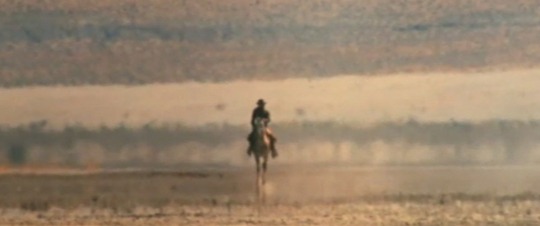
14. ACID EASTERNS
Earl trekked to the East and squinted into “one beacon in the dust weaving”—like Clint Eastwood arriving out of the hazy horizon ether of High Plains Drifter (1973). But Earl is heading to the East, blackwards. And though Brother J claimed you can’t define what’s direct from the East, Jeru told us on The Sun Rises in the East that you can’t stop the prophet either. So on “EAST,” Earl traverses a tricky terrain—it’s tricky, tricky, tricky because it’s an acid western landscape: an acid eastern.
The path isn’t direct or linear—it zigs and zags like rolling papers, and stimulates the same. “Double back when you got it made,” Earl says at the start of his journey “EAST.” The objective is to talk sense condensed into the form of a poem like Special Ed once did on “I Got It Made.” Instead, Earl’s poems—his L=A=N=G=U=A=G=E poems—skew [non]sense, go form[less], and vaporize rather than condense. Lyn Hejinian in cinnamon Timbs: “constant change figures / the time we sense.” The narrative is hallucinogenic (note: “how the story careen against the bars”). Earl’s bindle contains “thirty racks and weed [with] no fat in the collard greens.” That’s how he gets funky on the mic like an old batch. That’s how he gets sincerity on the mic: “Off top it’s me—no cap, / I don’t bottle things.” That buck that bought a bottle could’ve struck the lotto, maybe. But Earl’s “canteen was full of the poison [he] need[s].” He gets where he’s going like El Topo, bereft. The “trip was long and steep”—that being an acid trip—so let me see you try to ride a horse into the chasms of the canyon.
“EAST” is a death meditation, a grand duel between Dantean and Donneian lyric voices [he damn-near well should’ve double-tracked the vocals]. In a 2015 interview with SPIN, Earl is asked about the worst thing he did that year, to which he replies: “Umm…acid?” He elaborates: “I took it at a time when I really didn’t need to be taking acid. I had like a fucking existential crisis at, like, four in the morning. But it was tight. We reeled it back.” Jodorowsky called El Topo (1970) an “eastern” in that it “incorporat[ed] ancient eastern wisdom in the materiality of American cowboys.” For Earl, it’s more a rhinestone cowboy—he holds the cold one like he holds an old gun (as evidenced in the “EAST” music video). DOOM was no stranger to grief, of course, and the rumors persist regarding the bad acid that precipitated Subroc’s early demise (“Bad Acid” also being the original title for “December 24”).
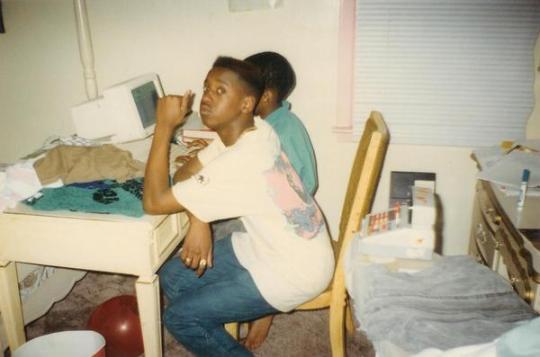
Estranged Earl, alienated—a high plains drifter (not Clint Eastwood, though) who rechristens a town “Hell” through a baptism of blood. Like the Beastie Boys’ version, Earl pulls out a pair of pliers and pulls a bullet out of his chest. He pulls through, true and living. “I’m long distance from my girl,” Mike D raps, so he’s “talking on the cellular,” but Earl is more alienated than that—beyond racking up roaming charges, immersed in dead zones. He “lost [his] phone and consequently all the feelings [he] caught for [his] GF.” Relationships can’t be sustained in these bleak and barren locations. All the blood has been drained from the ruddy faces—sanguine scenery. In his essay “On the Acid Western,” Jonathan Rosenbaum discusses how the subgenre “refuses to respect or valorize bloodshed.” Memory really leaking blood. Congealing. Stuck. To paraphrase Rosenbaum, Earl’s acid eastern “formulat[es] a chilling, savage frontier poetry to justify [his] hallucinated agenda—a view at once clear-eyed and visionary, exalted and laconic, moral and unsentimental, witty and beautiful, frightening and placid.” Earl’s “innocence was lost in the East,” and obsessives speculate whether this refers to Samoa or New York City—how far east we going? Countless spirit-questers pit-stopping at ashrams, searching for that Gifted Unlimited Rhymes Universal guide.
“I wait a beat,” Earl says. His canteen stays filled, auto-replenishes. His “cognitive dissonance shattered” and the “necessary venom restored.” Jodorowsky reportedly once taped snakes to his chest for an experimental theater performance. As if it matters if you think it matters anymore. Or, as ELUCID says, “Words mean things but don’t have to.” Acids and bases. Occident and Orient. Western and Eastern. Up is down.
15. NOTHING LIKE US EVER WAS
Earl’s “EAST” accordion beat—or whatever Orkes Gambus Al Fata instrumentation is at work—is more madcap than madvillainous. In my head is Erick Sermon, though, speaking about how “the flow slow…like a jazz player, or someone on the accordion” on “Knick Knack Patty Wack.” But I’m less concerned with the flow of air through bellows—compressing and expanding—than I am with Earl’s rendering of wind. (Somebody tooted.)
“Let the dead be dead,” Carl Sandburg says at stanza’s end in “Four Preludes on the Playthings of the Wind” (1920). Later, he reports, “The only singers now are crows crying.” And so Earl, a lonesome crow, reminds us—and himself—that “the wind get the ashes in the end” on “December 24.” The whining, wheezing consonance of /-nd/ in “wind” and “end” manages to evoke both the wind itself and the circularity of life. The bar whooshes and whips until we’re at our end, the terminus. That circularity, that full circle: ashes to ashes. “We are the greatest city,” Sandburg repeats, “the greatest nation: / nothing like us ever was.”
Global winds be blowin’—[Of the Soul]—and so billy woods cites that same line on “Haarlem”: “Thebe said the wind get the ashes in the end, bruv.” Check the configuration of the rhime:
The wind | gets | the ashes | in | the end
{birth} {life} {death}
Even that get does work—whether it’s the violence of Death Grips’ “get got”; Too $hort threatening you to “get in where you fit in”; or the satirical sadism of Keenen Ivory Wayans’ I’m Gonna Git You Sucka. The wind wins out—it gets what it wants. On “EAST,” the wind—infinitely personified—“whispered to [Earl], ‘Ain’t it hard?’” It ain’t hard to tell that it is. How about some hardcore? Yeah, we like it raw like M.O.P. But those burns yield ashes. In Adrienne Rich’s poem “The Burning of Paper Instead of Children” (1989), she struggles with the words she uses, knowing “[t]his is the oppressor’s language / yet [she] needs to talk to you.” I know it hurts to burn, she writes, but writing is no less ardent. “The typewriter is overheated, my mouth is burning.”
Let me bring it back to Robert Bly. “In the ancient times,” Bly says, “the movement for the men was downward—a descent into grief. It’s referred to in the fairytale as ‘the time of ashes.’” Ashes, he explains, is the “code word for the ‘out of it’ time.”
We know what it is like to take ashes in our hands. How light they are! The fingertips experience them as a kind of powder… Ashes, we note, find their way into the whorls of our fingertips, cling there, make the whorls more noticeable, more visible, more clear to us. We can take our own fingerprints with ashes.
Ashes, then, aren’t simply for the wind’s taking—ashes are for us, are necessary for us to transcend the grief the boys, the men, and the man-child experience. Bly points to the various cultures that have used ashes in initiation rites: “Ashes Time is a time set aside for the death of that ego-bound boy.” Ready to give up, so you seek the Old Earth. The elders cover your face—even your whole body—with ashes “to make [you] the color of dead people and to remind [you] of the inner death about to come.” Consider Earl’s ashen white face produced in the negative imagery of the “Grief” music video.” “The word ashes contains in it a dark feeling for death,” Bly says. “Ashes when put on the face whiten as death does.”
Earl Sweatshirt is a far cry from knocking blunt ashes into caskets.

16.
Feet of clay, hands of light…
—Moor Mother and billy woods, “Furies” (2020)
For Cheryl I. Harris, Earl’s mother, the feet of clay refer to a vulnerability we all possess no matter how formidable we may appear to become. Earl invokes the King of Babylon’s dream, a dream of an idol “meant to represent all the empires of the world,” echoing Sandburg’s imperious “greatest nation.” Earl believes “we at the feet of clay right now…We posted up live from burning Rome.” Imagine the ash pile. So Earl is here, ostensibly, to turn the disco into something dismal—how Mtume becomes “MTOMB” with its entombed sonics, as if he’s rapping from within a wall, the victim of some Poe immurement.
17.
“I remember woods,” Earl raps on “OD.” “I remember Endom when he wasn’t remembering much, / I remember love healing the ruptures.” I remember is also the refrain and title of Joe Brainard’s poem-memoir, a term which aptly describes much of Earl’s recent output. Brainard’s memories bum-rush into the present:
I remember a dream I used to have a lot of a beautiful red and yellow and black snake in bright green grass.
I remember painting “I HATE TED BERRIGAN” in big black letters all over my white wall.
I remember liver.
If Earl recalls love “healing the ruptures,” then he also likely recalls Fanon: It is essential to convey to the black man that an attitude of rupture has never saved anyone. But Fanon also speaks of young Black men “maintain[ing] their alterity. Alterity of rupture, of conflict, of battle.” Earl, “feeling rushed, grew up quick.” He echoes Biggie, who “grew up a fucking screw-up,” and Raekwon, who “grew up on the crime side” (though Earl’s mama taught him, as we know from “Grief,” how to avoid the pigs, persecution, and prosecution). Eyes on the clock, Earl acknowledges this “trip around the sun” is his “25th,” so “give it up”—his survival alone deserving of a standing [on the corner] ovation. He celebrates life with “gin and rum.” Again, notably not gin and juice—murder was never the case. The only death is the inner death, the death of the ego-bound boy, that Bly describes. Earl’s gin is the drink of be[gin]ning, of genesis (“Light them Phillies up then…”), of Super Nintendo, Sega Genesis, when I was dead-broke, man… “We wasn’t supposed to be alive,” Earl says, yet here he stands.
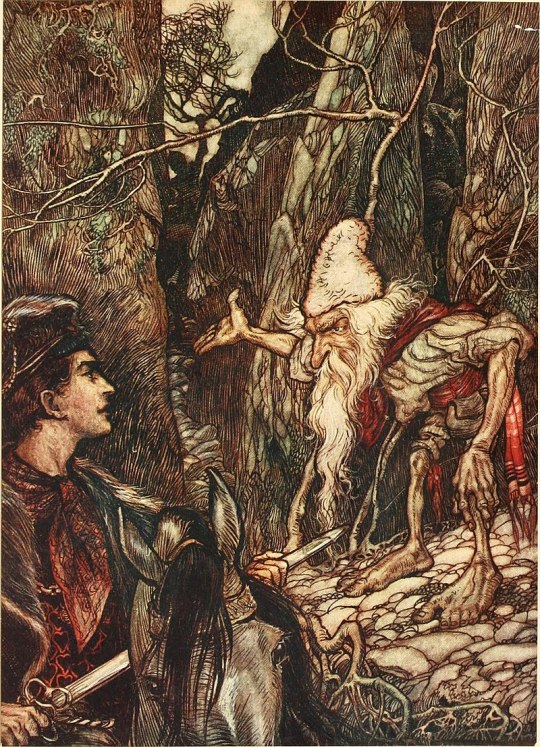
18. RUMINANT
Stare at the Feet of Clay album cover—an evocation of folkloric imagery: a Grimm forest with gnarled tree branches—and the enchanted, diabolic goat lying in wait. Earl’s parasocial following speculate G.O.A.T., of course, but I’m more inclined to mythopoeic possibilities. The Feet of Clay goat glares like Baphomet but frolics like a faun over fractured beats. “OD,” Earl has stated, “brought [him] up out of [his] little wreck”—a wreck of wracked nerves. Adrienne Rich encourages “diving into the wreck” (1973).
I am blacking out and yet
my mask is powerful
it pumps my blood with power.
Earl’s right there with her, submerged and blacking out, but still surviving: Really leaking blood, but refilling the pump.
In her essay “Teaching New Worlds/New Words,” bell hooks invokes Rich’s struggle to navigate the “oppressor’s language.” For hooks, as a Black writer, managing that is even more difficult and historical. “I think now of the grief of displaced ‘homeless’ Africans, forced to inhabit a world where they saw folks like themselves, inhabiting the same skin, the same condition, but who had no shared language to talk with one another, who needed ‘the oppressor’s language.’” hooks explains how Black folks have “remade that language so that it would speak beyond the boundaries of conquest and domination.”
Earl Sweatshirt, especially in his later work, has “altered [and] transformed” English, just as “enslaved Black people took broken bits of English and made of them a counter-language.” The emotional wreckage is also a linguistic heap of fragments—micro-fragments, if we’ve learned anything from Saafir. Earl, in the tradition of his ancestors, “put[s] together [his] words in such a way that the colonizer ha[s] to rethink the meaning of the English language.” “The grammatical construction of sentences in these songs” by Earl, just as by the spirituals of hundreds of years prior, “reflect[s] the broken, ruptured world of the slave.” That crumbling empire Earl mentions was faulted by feet of clay.
At the Museum of Contemporary Art in Los Angeles in 2019, sharing a dais with his mother, Cherly I. Harris, Earl spoke to this lineage directly: “Rap music is slave music—the modern-day iteration of it. Slave communication had to be encrypted. You got a code.” He shifted: “If I know what I’m saying…I can teach it to you.” On Feet of Clay, Earl is teaching to transgress. “I’m cracking my own code,” he says to an audience member during the Q&A, “how it comes out garbled…,” and then he trails off, as if making a deliberate effort to keep his answer cryptic.
hooks always saw language as “a site of resistance.” This included the incorrect usage and placement of words—she called such practices a “rebellion.” Weaponizing syntax. hooks recognized rap music as a continuation of this fight—the latest [sound]clash, hip-hop artists as rebels without a pause—while still acknowledging the collateral damage it might cause.
Rap music has become one of the spaces where black vernacular speech is used in a manner that invites dominant mainstream culture to listen—to hear—and, to some extent, be transformed. However, one of the risks of this attempt at cultural translation is that it will trivialize black vernacular speech. When young white kids imitate this speech in ways that suggest it is the speech of those who are stupid or who are only interested in entertaining or being funny, then the subversive power of this speech is undermined.
Or, as Earl once said on “Chum,” “Too Black for the white kids and too white for the Blacks,” an axiom he’s come to loathe. Perhaps Fanon had the better bar on this subject: “The white man had the anguished feeling that I was escaping from him and that I was taking something with me. He went through my pockets. He thrust probes into the least circumvolution of my brain. Everywhere he found only the obvious. So it was obvious that I had a secret.”
Despite the pitfalls (and, yeah, the pit is bottomless), Earl’s words play [wordplay] a part in retraining minds, all while exorcizing his own demons through a steady diet of ashes and fractures. hooks promises us that “in the patient act of listening to another tongue we may subvert that culture of capitalist frenzy and consumption that demands all desire must be satisfied immediately.” Through his embrace of a language that indulges in passion and cerebral coding, Earl “heal[s] the splitting of mind and body” so common within Western metaphysical thought. Earl Sweatshirt speaks “words that do more than simply mirror or address the dominant reality”; he builds blips into a reality that is worth the rewind.

Images:
Dead Man, dir. Jim Jarmusch, 1995 (screenshot) | Teen at 1990s computer photograph, Unknown (c. 1996) | James Joyce, Age 2, Unknown | ELUCID, Osage album cover (2016), photo by Michael Mally, Philadelphia Inquirer | The Boxer at Rest, bronze statue, Palazzo Massimo alle Terme, Rome, Italy (330-50 BC) | Alphonse Legros, The Pit and the Pendulum, second Plate (1861) | High Plains Drifter, dir. Clint Eastwood, 1973 (screenshot) | Subroc on an Apple IIc, Unknown (c. 1987) | Earl Sweatshirt, “Grief” music video, 2015 (screenshot) | Arthur Rackham, The Water of Life, Grimms Fairy Tales (1916) | Dead Man, dir. Jim Jarmusch, 1995 (screenshot)
125 notes
·
View notes
Text
the thing about 814 "size difference" is that yes the illusion is enhanced by proportions & posture & camera angles yes oscar is just slightly taller and bigger than lando and yet the funniest part 2 Me is that for some reason they both approach it from completely diametric extremes............. i.e. lando is obsessed with constantly mentioning how much taller oscar has gotten and pointing out the size of his arms etc. etc. while oscar shies away from any self-perception and is genuinely convinced he and lando are still the same size. like the true difference lies somewhere in the middle hope this helps 🧡
#listen#i have so many thoughts.... every day i am 5s away from creating an elaborate video comp elucidating my favorite parts of the 814 dynamic#which i shan't do. probably. ok bye 🧡#text
83 notes
·
View notes
Text
Dave: well you see, the explanation is perfectly simple and scientific.
Dave: it was because shut up.
Dave: shut up is why.
#homestuck#incorrect homestuck quotes#dave strider#mod terezi#thank you for elucidating us on that i was so lost
51 notes
·
View notes
Text
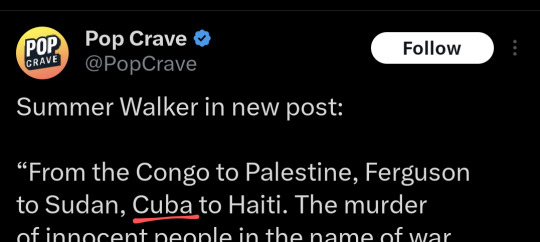
Why I was immediately suspicious of how quickly those "Palestine isn't the only issue right now ‼️" posts trying to enumerate all ongoing genocides in the world spread tbh. Self described activists need a better nose for this
#abstraction is the quantitative equivalence of qualitatively different entities#if the mechanism for abstraction isn't clearly elucidated then abstraction just becomes a flattening of qualitative differences#which is one of the easiest structures to weaponize#i dont think half these issues are meaningfully abstractable to one another
73 notes
·
View notes
Text
my elucidator is coming in soon... hee hee.... new things on the way (the same brand of insufferability but 500x worse at the completion of this life goal)
1 note
·
View note
Text
my PI and i are almost done my research paper and we're probably gonna submit it in the next couple of weeks so now i finally gotta give the paper A TITLE.... AAAAAAAAAAAAA
#how the FUCK do you choose a title#every title i think up sounds so boring#“elucidating the mechanism of formation of blah blah via time-resolved in-situ blah blah...” YAWN
25 notes
·
View notes
Text
an organization that’s able to claim nonprofit status is not by nature good, still operates in a society wth capitalist incentives, and many of them literally exist with the primary (albeit unstated) purpose of enriching their owners and stakeholders. these organizations have employees who they abuse with as much frequency and impunity as any other business, and often have an easier time doing so because they can convince the people who work for them that it’s worth burning themselves out for a good cause.
this article touches briefly on charities that are known to deliberately funnel funding into investors pockets via salaries and “fundraising” events but also discusses how in general donating to high-profile nonprofits still does much less good than donating directly to people who actually need help or smaller orgs that actually focus on helping people on the ground:
this one touches on the overwork and wage theft tha’s extremely widespread among nonprofits:
#people being dumbfucks abt ao3 heavily inspired this post#should probably think abt writing something to this effect with a more distinctly communist analysis to it#the conclusions these articles try to lead the reader to are very lame#but they elucidate the point of the post at least
445 notes
·
View notes
Note
how can you be a lesbian who’s attracted to/fucks all genders? genuine question no hate just doesn’t align with my understanding
hi!! thanks for asking I LOVE this subject and am so happy to talk about it!! This reply might get kind of long so I apologize in advance hehe <3
I assume you're sending this in response to the ask I got the other day asking about if bisexual women can say dyke, to which I said that I am bisexual & also a dyke (woman is debatable). That's the first place I want to start—that bisexuality does not necessarily equal attraction to all genders. It can! And I have no problem with someone who is attracted to all variations of all genders identifying with the lesbian label if that's what makes sense for them. But for me, I am attracted to women, and men, and people who fall outside of that binary—but I am not necessarily attracted to gendered expressions.
Personally, someone's gender identity really doesn't impact whether or not I might be attracted to them. I am specifically attracted to people who's gender expressions align with or reflect my own in some way—so as a butch, as someone who moves through the world as a lesbian, as someone who identified as trans masculine for several years, who has been on T and may go on T again—that is pretty expansive. For me, I am attracted to queer versions of masculinity—in all its shapes & variations. I don't think that experience precludes me from using the lesbian label! There is not one person that sees me move through the world that does not immediately clock me as a butch lesbian. I cannot change that (and nor do I want to). Does the fact that sometimes I fuck & fall in love with men mean that they're wrong? Or that I am for feeling comfortable with that label?
And that really isn't a new experience!! I am absolutely not alone in that kind of attraction model, and I am not the only person who gets clocked as a lesbian that is attracted to people who aren't women.
I can think of many significant figures & authors & activists in lesbian history who have really traversed what has been coined the "butch/FTM borderlands" by author C. Jacob Hale in 1998. Identity categories do not have hard borders—there's a liminal space that exists between them, and it's impossible to draw a distinct line between them. Hell—even the poet & lesbian icon Sappho wrote about both same-sex and different-sex relationships.
I think of communist, activist & author Leslie Feinberg & the exploration of being a leftist, working class butch in the 60's & 70s in Stone Butch Blues. That novel in particular, although fictionalized, is very much a reflection of their own life and details relationships with many different kinds of people while being very much rooted in lesbian culture.
I think of Jen Manion's article in Transgender Studies Quarterly titled "Transbutch," (article begins on page 213 of the linked pfd) where they write the following:
‘‘Transbutch’’ signifies a gendered embodiment that is both butch and trans, not tied to any singular definition of butch or trans but rather falling somewhere in between. Transbutch marks a liminal space that embraces both the historical legacies of the category of butch and the more expansive possibilities created by the transgender rights movement for recognition, community, and empowerment."
(italics my own) In other words, transbutch is about that sticky place between two identities. Someone can have ties to both of these identities at once—particularly since they have been so historically tied in terms of community.
And the argument being made by Manion I think really connects to the discussion here - being a lesbian is about more than who you sleep with. It's a political identity, it is a gender in of itself, it's about your community and how you connect to it.
Many of the lesbian icons that the community holds dear trouble the "woman loving woman" definition of the identity. And besides—it's not like lesbian is a finite resource. We have infinite space to welcome all kinds of people, anyone who wants to be in community together. There are so many ways to move through the world and so many ways to come to this identity.
Anyway! I don't know how to end this! I hope it was helpful <3
#asks#lesbian#bi lesbian#butch#other recommended reading that I couldn't fit into this discussion is butch is a noun by S Bear Bergman#or Female Masculinity by Jack Halberstam#^ these are more about the butch/transmasc borderland and not lesbian/bisexuality. but yknow. I think they still elucidate something about#this conversation
25 notes
·
View notes
Text
I love Firewalker as a call sign for Harry, beyond its reference to Twin Peaks. The name evokes for me a phoenix, one who passes through flames that destroy their old form and emerges on the other side reborn anew.
Except Harry is such a shitty phoenix, oh my god. He's not reborn in majesty with plumage spread, ready to take flight. He returns from the edge of death as a hungover naked baby covered in slime and barely able to stand. His bender killed his old self, but his new self struggles to be born. That’s the real trial by fire.
Besides the initial call to Precinct 41 (after which I loved Jules’ beleaguered sigh at the name every time I called in), I only used the name Firewalker one other time. After igniting Cindy's graffiti, I had this exchange with Gaston:

GASTON MARTIN - "*Mon dieu*, you set it on fire!” He looks at the plaza. “What kind of policeman are you?”
YOU - "Firewalker. I walk in the flames."
And at this point – after the tribunal, after another near-death experience, after five days of helping the people of Martinaise – Harry has finally walked through the other side of the flames.
#harry du bois#disco elysium#disco elysium spoilers#disco elysium meta#disco elucidations#firewalker#i've only seen the first season of twin peaks i'm sure someone else could go into the parallels more in depth
166 notes
·
View notes
Text
Sometimes folks on here use the tag #quinn hills, but then I look at the post and have no idea what they’re talking about
Turns out it’s a web series about an alternate universe version of me who’s a boy
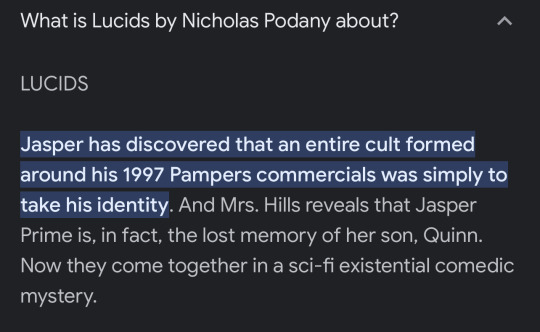
123 notes
·
View notes